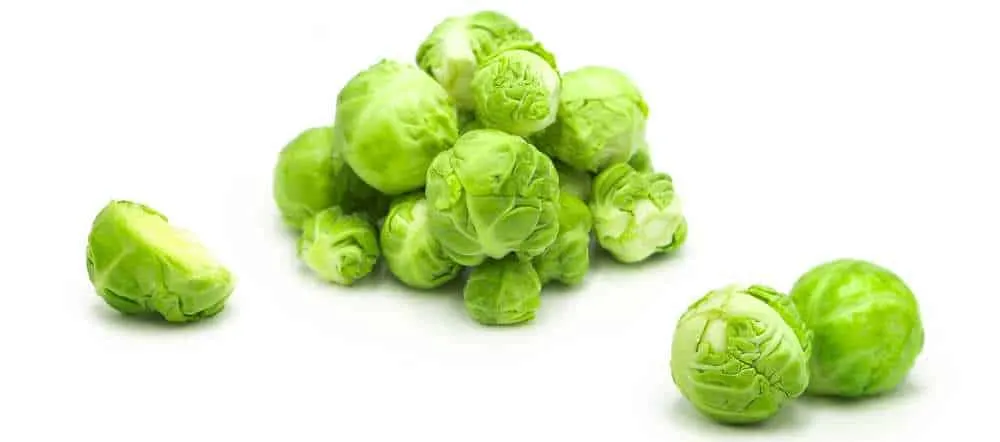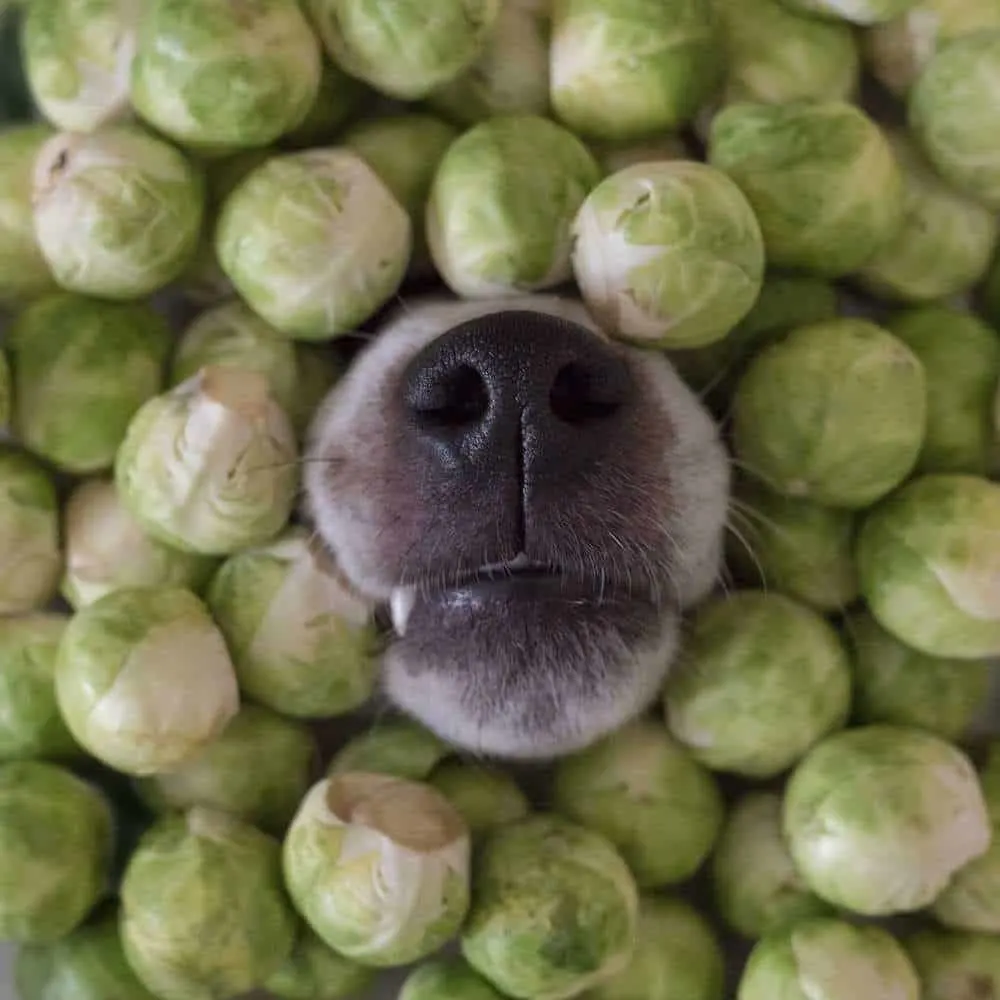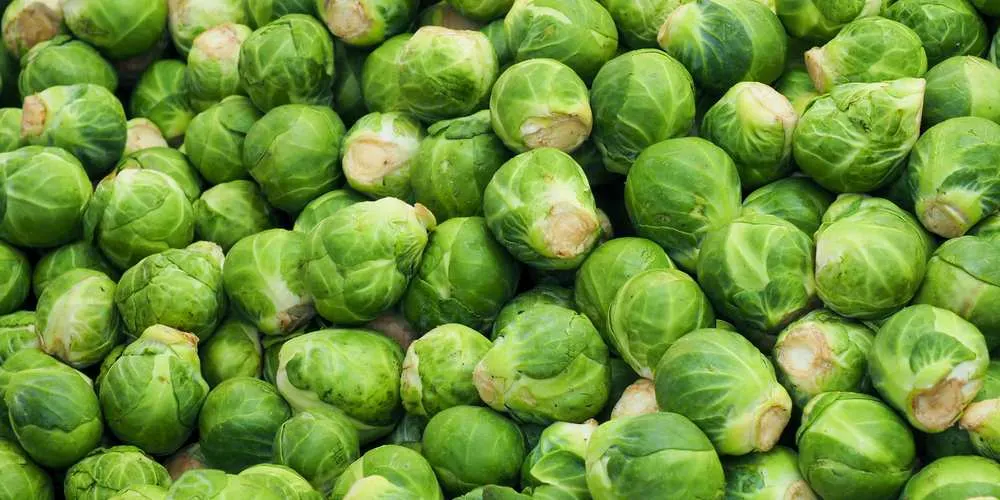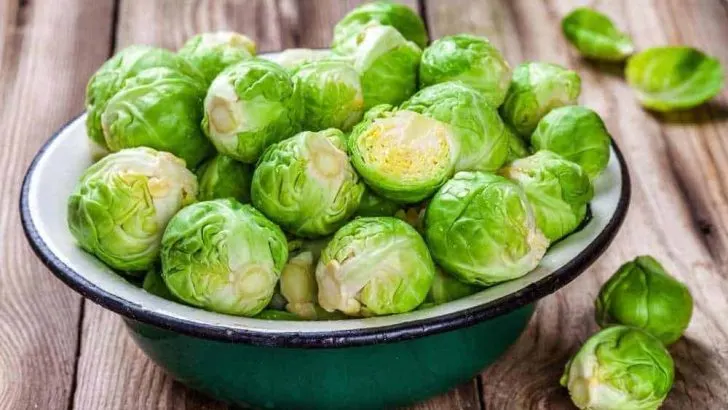Brussels sprout is that kind of veggie you either love or you hate. But the fact is that these little green balls are very healthy and nutritious. Brussels sprouts are an excellent source of protein, vitamins, and contain few calories.
But perhaps you are worried about your dog accidentally eating a few Brussels sprouts from the kitchen counter. What can you do, dogs are just like that sometimes.
Now you’re looking at Charlie wondering whether you should take him to the vet or there’s nothing to worry about. So the question is hanging in the air – Can Dogs Eat Brussels Sprouts?
We’ve created this article to provide you with valuable information like: can dogs eat Brussels sprouts, what are the risks and health benefits, and how much Brussels sprouts can your dog eat, so read on!

Can Dogs Eat Brussel Sprouts?
Yes, dogs can eat Brussels sprouts. When fed in moderation, these small cabbages are perfectly safe for dogs. When fed in small amounts, Brussels sprouts can be a great addition to your dog’s diet and can keep the weight under control, since it is a low-calorie treat.
Nonetheless, let’s take a look at the nutritional chart of Brussels sprouts per 100 g:
| Calories | 57 |
| Fat | 0,3 g |
| Carbohydrates | 10 g |
| Fiber | 4 g |
| Protein | 4 g |
| Cholesterol | 0 g |
| Sodium | 25 mg |
| Sugar | 2,2 g |
| Potassium | 389 mg |
| Vitamin C | 141 % |
Besides these, Brussels sprouts also contain proper amounts of vitamin A and vitamin B-6. Moreover, some of the essential minerals that these cabbages have are magnesium, iron, and calcium.
As you can see, Brussels Sprouts contain almost no fat, no cholesterol, and very few calories. That is perfect for your dog, as including fats in your dog’s diet can have significant health risks. Too much fat can lead to indigestion and inflammation of the pancreas, known as pancreatitis.
Instead, Brussel sprouts contain proper amounts of protein and fiber that help dogs effectively absorb necessary nutrition, digest more efficiently, and benefit cell production. Also, antioxidants beta-carotene, lutein, and zeaxanthin help protect the body from damage by free radicals.
Can Dogs Eat Raw Brussels Sprouts?
Although that may sound like a good idea, we don’t recommend feeding your dog raw Brussels sprouts. Your dog likely won’t be able to digest them fully and raw sprouts can cause stomach problems. But let us explain further.
Brussels sprouts are from a cruciferous vegetable family, and they are small cabbages. Yes, they are rich in nutrients, but there is also an unfortunate side effect of flatulence (accumulation of gas in bowels).
That’s because Brussels sprouts contain a compound called isothiocyanate. In short, it helps the intestinal tract send waste and food on its way. Moreover, this compound reduces the risk of gastrointestinal and respiratory tract cancer by fighting off carcinogens and clearing the digestive tract. You may be thinking now – this is good, right? Yes, in one way because it maintains healthy digestion. The not-so-likable thing about that is gas that will eventually find its way out, and then it will not be so comfortable to be around your dog.
Other than that, too many sprouts can cause stomach problems such as vomiting and diarrhea. That is not life-threatening, just be careful as to how much sprouts your dog consumes.
Can Dogs Eat Brussels Sprout Stalk?
The answer is – no. Raw Brussels sprout stalks are not considered safe for dogs to eat. Unpeeled, they have thick outer casings that are very fibrous. Be very careful as small dogs trying to devour unpeeled raw Brussels sprout stalk may risk perforation, impaction, and choking. However, stems may be safe and edible on the inside, just peel it and steam the rest.
How Many Brussels Sprouts Can My Dog Eat?
There is certainly no doubt that Brussels sprouts are healthy for your dog, but it is strongly advised to limit the intake.
Brussel sprouts, like any other veggie, should be given in moderation. You can provide the sprouts as an occasional treat or mix it with other high-quality dog food.
To set the record straight, let’s check the chart below:
| Small size dogs (20-40 pounds) | Half a Brussels sprout | Once every other day |
| Medium size dogs (50-90 pounds) | 1-2 Brussels sprouts | Per day or once every other day |
| Large size dogs (100-150 pounds) | 2-3 Brussels sprouts | Per day or once every other day |
We advise serving your dog sprouts only once in a while, mixed with other quality dog food or as a special healthy treat. Remember that even small amounts of Brussels sprouts can also cause flatulence, so be careful how you dose it to avoid diarrhea and stomach problems.

Are There Any Health Benefits?
The answer is – yes! There are many health benefits that Brussels sprouts can provide to your dog.
Brussels sprouts are rich in nutrients such as vitamins, fiber, protein, and antioxidants. They contain no cholesterol and have almost no fat, which makes them a perfect healthy treat.
Brussels sprouts are excellent for overall colon health and help bowel movement. They also contain sulforaphane and indole-3-carbinol. Research shows that these compounds help fight cell-damaging free radicals in the body, reducing cancer risk.
Antioxidants found in Brussels sprouts benefit blood health, circulation and reduce inflammation. Also, fiber regulates the digestive system and helps maintain gut health.
Furthermore, iron that is found in sprouts is very beneficial for dogs. Iron gives more energy as it helps create red blood cells and hemoglobin, which is responsible for oxygen distribution around the body to the brain, organs, and muscles.
Brussel sprouts also contain proper amounts of protein, which are beneficial for weight regulation, strong bones, and muscles, tissue repair, healthy coat and skin, production of antibodies, better circulation, etc.
Large amounts of vitamin K (Potassium) help improve cardiovascular health, strengthen bones, and activate blood clot ability.
Vitamins A, B, C, and E will improve energy levels and overall health. Some of the benefits are:
- Better and faster healing
- Glossier and soft coat
- Shinier and healthier teeth
- Improved vision
- Fighting premature aging
- Prevention of diseases
- Improving cognitive functions
- Providing healthy cells, tissues, organs
- Helping with mental focus
- Regulating hormones
- Heart protection
- Healthy nerves and proper neurological function
- Boost immune system
- Healthy blood sugar balance
- Prevention of kidney stones, asthma, and allergies
Generally, feeding your dog a healthy diet is important, and as you can see, Brussels sprouts can provide so many vital nutrients.
But suppose you’re unsure whether you should add sprouts to your dog’s diet because he has dietary or allergic issues. In that case, you can seek professional advice from your veterinarian. If you have the vet’s permission, you can start by adding small amounts of sprouts to your dog’s diet, and if everything seems to be okay, slowly increase the amount. If your dog has any reaction, it means he can handle this kind of vegetable, and you should avoid giving sprouts to your dog in the future.
Brussels Sprouts Alternatives
If your dog can’t digest or isn’t a fan of Brussels sprouts, here are some alternatives:
1. Pumpkin
Pumpkin is loaded with vitamin A, antioxidants, and fiber, making it an excellent supplement for constipation and diarrhea. Make sure it’s a canned pumpkin and avoid raw, sweetened, or spiced ones. The recommended amount is 1 tbsp every once in a while.
2. Bananas
Bananas can help keep the dog’s kidneys and heart-healthy, as they’re loaded with potassium. Carbohydrates and sugar in bananas will provide a boost of energy. Make sure to cut the banana into smaller pieces for easier consumption and give it occasionally in small amounts.
3. Apples
Apples contain the proper amount of fiber, vitamins A and C, and are low in fat. Because of that, apples can improve your dog’s metabolism, encourage healthy bones and tissues. Just remove the core and seeds because they contain cyanide and can be poisonous for dogs!

Preparing Brussel Sprouts For Your Dog
Start with choosing the Brussel sprouts that are green, firm, and fresh. If they are too old, your dog can have stomach problems, so pay attention to that.
Next off, wash the sprouts thoroughly in cold water and remove the stalk, while leaving the leaves intact. Slice each sprout in half, and always cook them before serving.
The best cooking preparation methods are:
- Steaming
- Boiling
- Microwaving
Boiling takes 10 minutes, but it doesn’t preserve much of the nutrients, so it is best to steam or microwave the sprouts. Steam the sprouts for 5 minutes or microwave them for eight minutes in a bowl of water.
Moreover, skip the herbs, spices, and oil as those can severely endanger your dog’s health. It may be tempting, but avoid adding seasonings like onion and garlic powder. Those are extremely dangerous if ingested and can damage red blood cells and lead to hemolytic anemia.
Also, salt is not an option as it can lead to bloat, indigestion, and pancreatitis. Serve plain Brussels sprouts to your dog, and remember – no more than 1-3 per serving!
Learn More: What Can Dogs Eat? A Comprehensive List Of Dog-safe Foods


